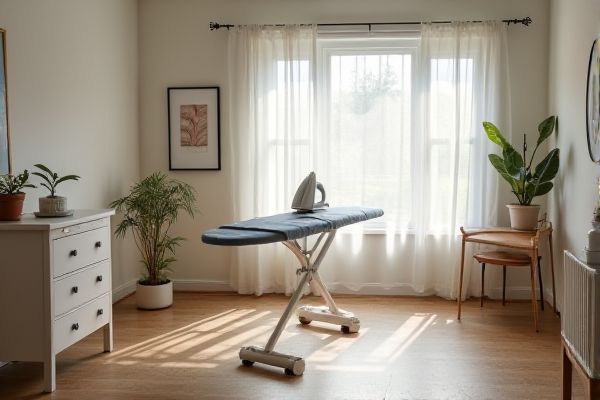
A built-in ironing board offers convenience and space-saving benefits by being permanently installed and easily accessible, while a portable ironing board provides flexibility and mobility, ideal for small spaces or travel. Discover which option suits Your lifestyle best by exploring the detailed comparison in the rest of this article.
Table of Comparison
| Feature | Built-in Ironing Board | Portable Ironing Board |
|---|---|---|
| Installation | Fixed, requires permanent setup | No installation, compact and easy to store |
| Portability | Stationary, built into furniture or wall | Lightweight, foldable, easy to move |
| Durability | Sturdy, often made with metal or wood | Varies; usually lightweight materials |
| Space Efficiency | Saves space by folding into wall/cabinet | Requires separate storage space when not in use |
| Price Range | Higher upfront cost due to installation | Generally affordable, wide price range |
| Setup Time | Instant use, no setup needed once installed | Requires unfolding and positioning before use |
| Ideal Use | Permanent home setup, saves floor space | Travel, small spaces, occasional ironing |
Introduction to Built-in and Portable Ironing Boards
Built-in ironing boards offer a seamless, space-saving solution integrated into cabinetry, ideal for permanent laundry room setups. Portable ironing boards provide flexibility and easy storage, catering to users needing mobility or limited space. Choosing between them depends on lifestyle, available space, and ironing frequency.
Space Efficiency: Built-in vs Portable Ironing Boards
Built-in ironing boards maximize space efficiency by folding seamlessly into cabinetry or walls, eliminating clutter and freeing up floor area in your home. Portable ironing boards offer flexibility and easy storage but require dedicated space when in use, which might limit your room's functionality. Your choice depends on balancing permanent space-saving with the convenience of mobility for your ironing needs.
Installation and Setup Requirements
Built-in ironing boards require professional installation, often involving wall mounting or cabinet integration, which may demand modifications to existing furniture or walls. Portable ironing boards have minimal setup requirements, offering quick assembly and foldable designs that allow for easy storage without permanent installation. Homeowners seeking convenience and flexibility typically prefer portable models due to their lightweight build and no-installation setup.
Mobility and Storage Considerations
A built-in ironing board offers seamless integration and space-saving storage by folding directly into cabinetry, making it ideal for small or fixed areas. A portable ironing board provides greater mobility, allowing you to move it easily between rooms or store it away entirely when not in use. Your choice depends on how much flexibility and storage convenience you need in your living space.
Durability and Material Quality Comparison
Built-in ironing boards typically feature higher durability due to integrated construction with sturdy materials like solid wood or metal frames, ensuring long-lasting stability and resistance to wear. Portable ironing boards often use lightweight aluminum or plastic components to prioritize mobility, which can compromise their overall material strength and longevity. Choosing the right board depends on your need for a durable, fixed setup versus a flexible, transportable option that fits your lifestyle.
Suitability for Different Living Spaces
Built-in ironing boards are ideal for homes with ample space and a dedicated laundry area, seamlessly integrating into cabinetry to save floor space and provide a stable surface. Portable ironing boards offer flexibility and convenience, making them suitable for smaller apartments, dorm rooms, or for those who need to store the board away after use. Your choice depends on the size of your living space and whether you prioritize permanence or portability.
Cost and Long-term Value Analysis
Built-in ironing boards typically involve higher upfront installation costs but offer enhanced durability and space-saving benefits, making them a cost-effective solution for long-term use in well-designed laundry areas. Portable ironing boards are more affordable initially and provide flexibility for storage and use in multiple locations, but they may require more frequent replacement due to less robust construction. Analyzing long-term value, built-in boards often deliver greater return on investment through consistent stability and convenience, while portable boards suit users prioritizing low initial expense and mobility.
Safety Features and User Convenience
Built-in ironing boards offer enhanced safety features such as secure folding mechanisms and stable mounting that prevent accidental collapses, reducing risk of injury. Portable ironing boards provide user convenience through lightweight, compact designs that are easy to store and transport, though they may sacrifice some stability. Consider your workspace and frequency of use to determine which option best supports your safety and convenience needs.
Maintenance and Cleaning Tips
Built-in ironing boards require regular maintenance such as checking the mounting hardware for stability and wiping the surface with a damp cloth to prevent dust buildup. Portable ironing boards benefit from easily removable covers that can be machine washed, ensuring hygiene and longevity. Both types should have their metal frames inspected periodically for rust and treated with appropriate cleaners to maintain safety and functionality.
Choosing the Right Ironing Board for Your Needs
Choosing the right ironing board depends on available space and usage frequency; built-in ironing boards are ideal for permanent setups in laundry rooms, offering stability and convenience without storage hassle. Portable ironing boards provide flexibility and easy storage, perfect for small living spaces or occasional use. Consider dimensions, weight, and surface material to match your ironing habits and home layout efficiently.
 homyna.com
homyna.com